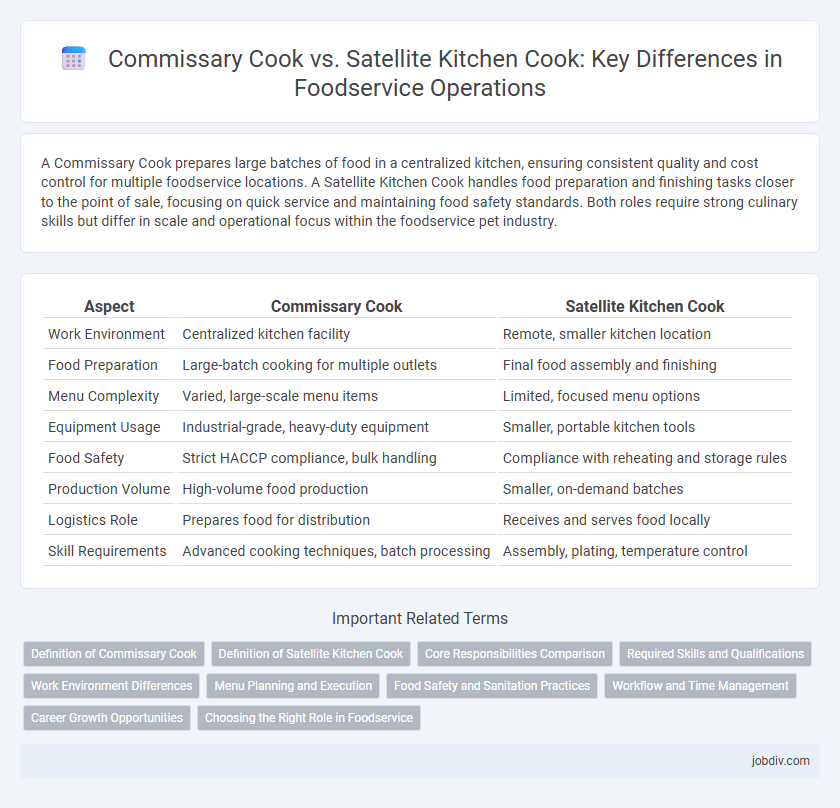A Commissary Cook prepares large batches of food in a centralized kitchen, ensuring consistent quality and cost control for multiple foodservice locations. A Satellite Kitchen Cook handles food preparation and finishing tasks closer to the point of sale, focusing on quick service and maintaining food safety standards. Both roles require strong culinary skills but differ in scale and operational focus within the foodservice pet industry.
Table of Comparison
| Aspect | Commissary Cook | Satellite Kitchen Cook |
|---|---|---|
| Work Environment | Centralized kitchen facility | Remote, smaller kitchen location |
| Food Preparation | Large-batch cooking for multiple outlets | Final food assembly and finishing |
| Menu Complexity | Varied, large-scale menu items | Limited, focused menu options |
| Equipment Usage | Industrial-grade, heavy-duty equipment | Smaller, portable kitchen tools |
| Food Safety | Strict HACCP compliance, bulk handling | Compliance with reheating and storage rules |
| Production Volume | High-volume food production | Smaller, on-demand batches |
| Logistics Role | Prepares food for distribution | Receives and serves food locally |
| Skill Requirements | Advanced cooking techniques, batch processing | Assembly, plating, temperature control |
Definition of Commissary Cook
A Commissary Cook prepares large quantities of food in a central kitchen facility designed to supply multiple satellite locations, ensuring consistency and efficiency across operations. This role involves managing bulk food production, following standardized recipes, and maintaining food safety standards to support distributed foodservice operations. Skilled in large-scale meal preparation, the Commissary Cook plays a critical role in streamlining food production for franchises, cafeterias, and institutional foodservice providers.
Definition of Satellite Kitchen Cook
A Satellite Kitchen Cook operates in remote kitchen facilities that prepare and deliver food to various service locations, unlike a Commissary Cook who works centrally in a primary kitchen producing large-scale meals. Satellite kitchens focus on maintaining food quality during transport and reheating processes, ensuring menu consistency across multiple outlets. This role requires expertise in efficient meal assembly, adherence to safety standards, and coordination with distribution logistics in the foodservice industry.
Core Responsibilities Comparison
Commissary cooks primarily handle large-scale food preparation, focusing on batch cooking, ingredient portioning, and packaging for distribution to multiple satellite locations. Satellite kitchen cooks specialize in final food assembly, reheating, and presentation to ensure quality and consistency at the point of service. Both roles require adherence to food safety standards but differ in scope, with commissary cooks emphasizing efficiency in volume production while satellite cooks prioritize timely meal service and customization.
Required Skills and Qualifications
Commissary cooks require strong skills in large-scale food preparation, inventory management, and adherence to strict food safety standards, often holding certifications such as ServSafe. Satellite kitchen cooks must excel in efficient meal assembly, quality control, and flexibility to meet diverse customer needs, with experience in rapid food production environments. Both roles prioritize culinary proficiency, time management, and the ability to work within established operational protocols.
Work Environment Differences
A Commissary Cook typically works in a centralized, large-scale kitchen that prepares bulk food items for multiple locations, emphasizing efficiency and consistency in a controlled, industrial environment. In contrast, a Satellite Kitchen Cook operates in smaller, on-site kitchens within individual establishments, adapting meals to specific customer demands while managing limited space and resources. The shift in work environment affects workflow, equipment usage, and interaction levels with front-of-house staff.
Menu Planning and Execution
Commissary cooks handle large-scale menu planning by preparing bulk ingredients and standardized recipes that ensure consistency across multiple satellite locations. Satellite kitchen cooks focus on executing these pre-prepared menus by assembling and finishing dishes on-site, maintaining quality and timely service. Efficient communication between commissary and satellite teams optimizes inventory management and reduces food waste.
Food Safety and Sanitation Practices
Commissary cooks handle large-scale food preparation in centralized kitchens, requiring strict adherence to food safety protocols such as temperature control, cross-contamination prevention, and thorough sanitation to ensure product safety during transport. Satellite kitchen cooks focus on reheating or final assembly, emphasizing precise sanitizer use and localized cleanliness to maintain food safety at the point of service. Both roles mandate rigorous HACCP (Hazard Analysis Critical Control Point) standards to mitigate risks and comply with FDA Food Code regulations.
Workflow and Time Management
Commissary cooks handle large-scale food preparation in centralized kitchens, optimizing workflow through batch cooking and streamlined processes to reduce food waste and improve consistency. Satellite kitchen cooks focus on finishing and assembling meals closer to the point of service, requiring precise time management to ensure fresh, on-demand delivery while coordinating with commissary schedules. Efficient communication between commissary and satellite kitchens is essential to synchronize production timelines and maintain food safety standards.
Career Growth Opportunities
Commissary cooks benefit from exposure to large-scale food production, enhancing skills in food safety protocols and high-volume meal preparation, which can lead to managerial roles within centralized kitchens or food service operations. Satellite kitchen cooks gain specialized experience working in decentralized locations, sharpening adaptability and logistical coordination that supports advancement into supervisory positions in multi-site foodservice management. Both career paths offer growth opportunities, with commissary roles leaning towards operational leadership and satellite roles favoring hands-on site supervision and flexibility.
Choosing the Right Role in Foodservice
Choosing the right role in foodservice depends on operational needs and skill sets; commissary cooks focus on large-scale food preparation in centralized kitchens, emphasizing efficiency and consistency for multiple locations. Satellite kitchen cooks work in remote or smaller kitchens, specializing in final assembly and finishing to ensure quality and timely delivery. Understanding the differences in workflow, food safety protocols, and production volume helps optimize staffing and improve overall service.
Commissary Cook vs Satellite Kitchen Cook Infographic

 jobdiv.com
jobdiv.com